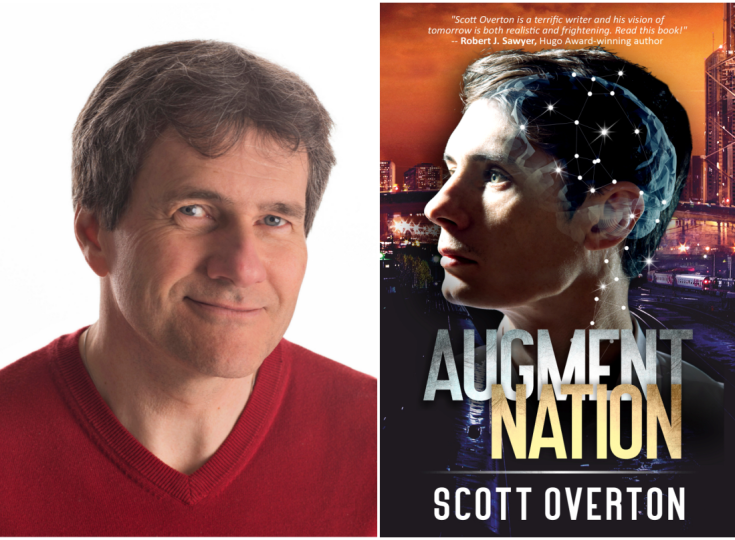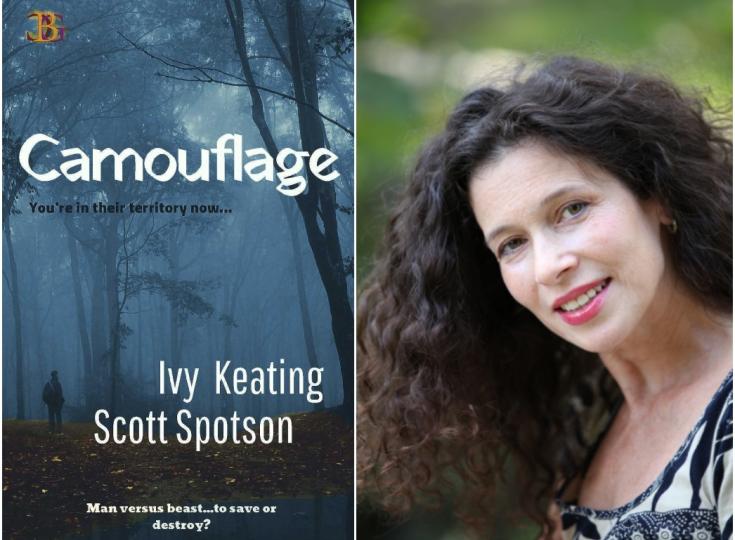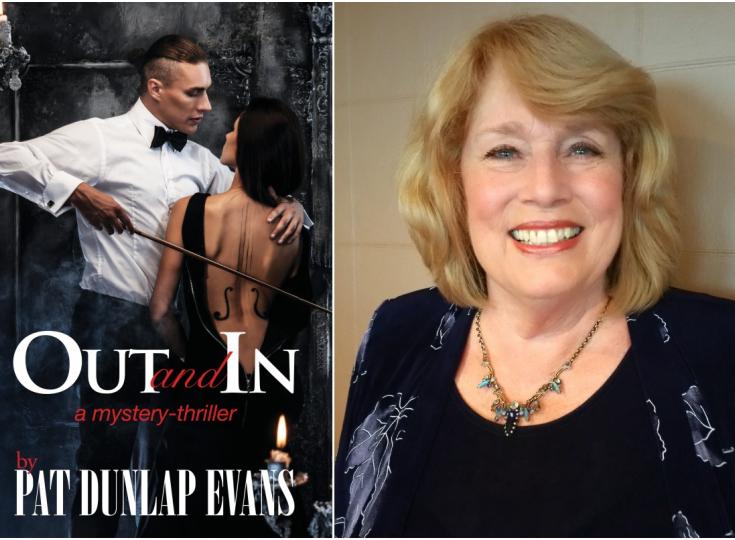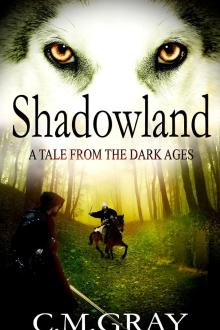Scott Overton - Thought Provoking Sci-Fi

With a long career as a radio morning show host, Scott’s first novel, the mystery/thriller Dead Air was set in the radio world (and shortlisted for a Northern Lit Award in Ontario, Canada). Since then he has taken the reader to even stranger places, including the human bloodstream in his SF novel debut The Primus Labyrinth, a science fiction thriller that reviews compare to Michael Crichton and Dan Brown. Scott’s short fiction has been published in many science fiction magazines and anthologies.He lives with his wife on a private island in Northern Ontario. As our Author of the Day, he tells us all about his book, Augment Nation.
Please give us a short introduction to what Augment Nation is about.
Augment Nation is set about twenty years from now when computerized brain augments become the hot commercial items like today’s smartphones. Damon Leiter has had an augment in his head since he was fourteen, so when the new technology enables marketing to become like mind control, and governments use it to manipulate their citizens, Damon is uniquely qualified to lead a resistance against the onslaught, though the struggle may cost him everything.
What inspired you to write this book? Was there anything in particular that made you want to tackle this?
Although I use computers, smartphones, an Apple watch, and lots of apps like everyone else, I’m often dismayed at how much access we give to corporations and governments into our private lives and personal information via our ‘smart’ devices, usually in return for just a little extra convenience. With the prospect of computer augments linking our brains directly to online networks like the internet, the potential for abuse is appalling. We have to recognize that this technology is coming and make decisions now about how to protect ourselves from those dangers.
What direction do you think consumer technology is going into in the near future, and how does this story incorporate your vision?
Computer-brain interfaces like Elon Musk’s Neuralink have been in development for years, originally to help people with neurological challenges or paralysis. But I really do think the technology will go commercial, providing all the functions we now use our smartphones for, plus much more. As we’ve all seen in recent months, artificial intelligence applications like ChatGPT are exploding in popularity, and finding their way into almost every kind of endeavour. Our smart devices (and eventually our brain augments) will be connected to AIs, and at some point it will be very hard to know who’s controlling whom.
Besides writing, what other secret skills do you have?
I was a morning show host in private radio for most of my career, so I’m a pretty good communicator and public speaker. I also do freelance voice work in my home studio, including narrating audiobooks. I love music, play guitar and sing a little, but people would be more likely to pay me to stop playing than to start.
Tell us more about Damon Leiter. What makes him so special?
Damon’s own brain-computer interface (implanted when he’s fourteen to correct a neurological condition) gives him a ten-year head start on everyone else who’s getting the commercial brain augments, so he already knows the technology inside and out as a user, how to infiltrate them and how to protect them. But he also suffered a terrible personal violation early on due to the device, which makes him very committed to battling against the abuse they can cause. He has no desire to be a leader or a hero, but once he understands that no one else can do what needs to be done, he’s willing to sacrifice whatever it takes.
Why, do you think, is brain augmentation so dangerous?
I don’t think that computerized brain augmentation in itself is necessarily dangerous. It’s the connectivity to wi-fi networks and the internet that poses the greatest hazard. That’s a two-way street, and we’ve already seen what hackers, spammers, and spoofers can do with our devices. Imagine that kind of thing involving direct access to our mental processes. And it’s not just criminals we have to worry about—marketers and governments won’t be able to resist the temptation to influence us as intrusively as they can get away with. But even without that connectivity, won’t we just turn all the effort of thinking over to our computer augment and let our own intellectual abilities atrophy? And if you add an AI to the augment, then who’s really doing the thinking anymore? So, as with most things in life, it’s not the development itself but how we use it that can be a problem.
Your book also highlights our tendency today to give companies way too much access to our personal information. Why, would you say, is that concerning?
We’ve seen plenty of evidence that corporations, by and large, have no moral compass. To them, profits are the greatest good, and any means to increase those profits are judged acceptable. To them we’re not partners in a relationship, we’re commodities. Our personal histories, tastes, and habits are now being traded and sold. Even if the concept of personal privacy isn’t important to you on its own, it’s easy to see that corporate practices like that are designed to manipulate us. And it works! They’re expert puppeteers. That’s not just an invasion of privacy anymore, it’s a real threat to our personal freedom.
What was your greatest challenge when writing this book?
Trying to keep ahead of the technology was pretty much impossible. Brain augmentation is a tremendously complex field, and attempting to forecast its future I was constantly reminded that no one predicted the ways the iPhone and related devices would change our society over the past fifteen years. Augment Nation would also have been different if I’d been able to foresee the sudden explosion of artificial intelligence applications I mentioned earlier, but I didn’t think AI would reach the current level quite so soon. My crystal ball let me down there.
How much research did this story require from you?
There was a lot of research needed to make it credible, from the details of the surgical procedures that Damon would undergo, to the electromagnetic frequencies that might be used, to an understanding of computer processes and their analog equivalents in flesh brains. I sometimes wished I were more familiar with coding, but I think that too much of that detail would have gotten in the way of the story.
What drew you to sci-fi as a genre?
I’ve been devoted to science fiction all my life as a reader, but as a writer there just isn’t any other genre that could express the ideas and themes I want to get across. I love to read other genres, but they feel very restrictive to me. SF can go and do almost anything anywhere, as long as it’s scientifically possible. Coming up with a really interesting “what if” and then exploring everywhere it might takes us can be a lot of fun.
Did you plan out the entire story before you started writing, or did some of it just "happen" along the way?
Both. I’m definitely a planner—I usually spend months outlining a novel before I really start writing it. But that outline isn’t etched in stone. Fresh plot twists and new elements are always coming to me during the writing process. And you know how some writers say their characters took over and did something unexpected? It’s no lie. The ending of Augment Nation came to me very near the end of the writing—it was just what had to happen, given the characters and what had gone before.
Do you have any interesting writing habits? What is an average writing day like for you?
When I was working in my radio career, I had to do all my writing in the evening, and now I do most of it in the mornings and evenings. I don’t have any strange tricks or habits, but I do try to stretch my skills each time out and do something I haven’t done before. Doing the same old thing time after time would feel too much like work! It also helps that I live on a gorgeous lake in northern Ontario. A little piece of Paradise.
What are you working on right now?
Most of my stories are present-day or near future, and rarely involve “outer space” in a big way, but my current work-in-progress does take place on a spaceship about a century from now. Since I’m not a space-opera kind of guy, it’s high-concept, complex, strongly thematic, and will either be great or a total flop. But that’s the risk of reaching high.
Where can our readers discover more of your work or interact with you?
My website www.scottoverton.ca is the best place to start because it has links to everything else, sample chapters, my blog, my ebook store, and a lot more. But I’m also on Facebook https://www.facebook.com/ScottOverton.author, Twitter @SFtruenorth, Goodreads www.goodreads.com/ScottOverton, and a number of other sites related to writing and science fiction. My universal book link page https://books2read.com/ScottOverton is a terrific way to find where to buy my books.






